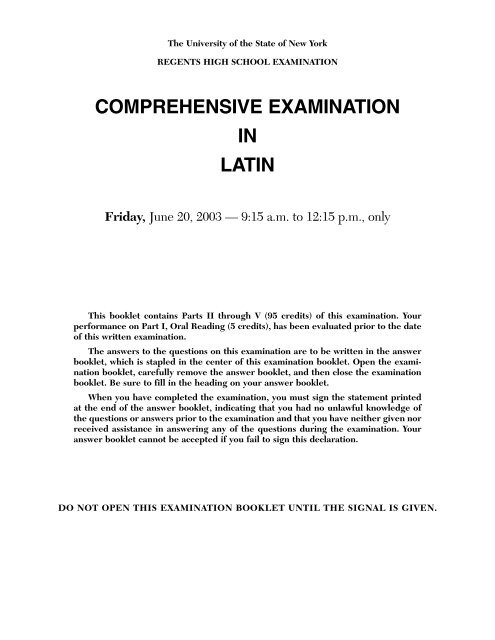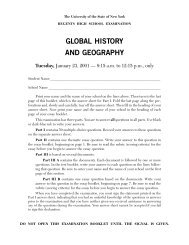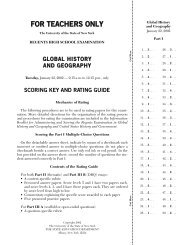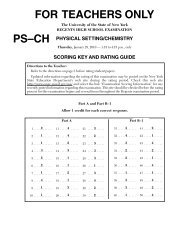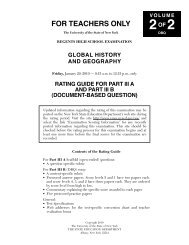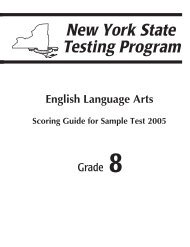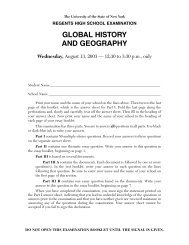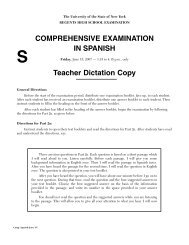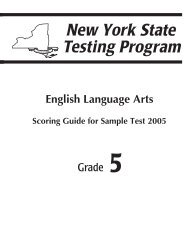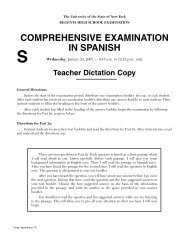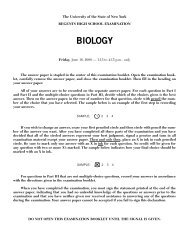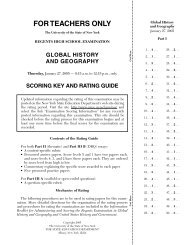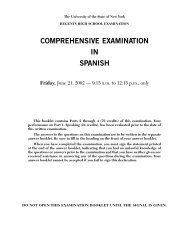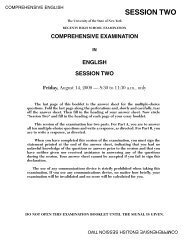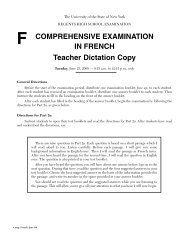9291140 Comp Latin Ju03
9291140 Comp Latin Ju03
9291140 Comp Latin Ju03
Create successful ePaper yourself
Turn your PDF publications into a flip-book with our unique Google optimized e-Paper software.
The University of the State of New York<br />
REGENTS HIGH SCHOOL EXAMINATION<br />
COMPREHENSIVE EXAMINATION<br />
IN<br />
LATIN<br />
Friday, June 20, 2003 — 9:15 a.m. to 12:15 p.m., only<br />
This booklet contains Parts II through V (95 credits) of this examination. Your<br />
performance on Part I, Oral Reading (5 credits), has been evaluated prior to the date<br />
of this written examination.<br />
The answers to the questions on this examination are to be written in the answer<br />
booklet, which is stapled in the center of this examination booklet. Open the examination<br />
booklet, carefully remove the answer booklet, and then close the examination<br />
booklet. Be sure to fill in the heading on your answer booklet.<br />
When you have completed the examination, you must sign the statement printed<br />
at the end of the answer booklet, indicating that you had no unlawful knowledge of<br />
the questions or answers prior to the examination and that you have neither given nor<br />
received assistance in answering any of the questions during the examination. Your<br />
answer booklet cannot be accepted if you fail to sign this declaration.<br />
DO NOT OPEN THIS EXAMINATION BOOKLET UNTIL THE SIGNAL IS GIVEN.
Part II<br />
Directions: Your teacher will read aloud a short passage in <strong>Latin</strong>. Listen carefully to this first reading.<br />
Then your teacher will read the passage in short phrases with a pause after each phrase. After each pause,<br />
write, in <strong>Latin</strong>, in your answer booklet, the phrase read by your teacher. Do not write a translation of the<br />
passage.<br />
There will be no penalty for improper use of macrons, punctuation, or capitalization. After you have<br />
completed writing the passage in <strong>Latin</strong>, your teacher will read the entire passage one more time so that you<br />
may check your work. [5]<br />
Part III<br />
Answer the questions in Part III according to the directions for Parts IIIA, IIIB, IIIC, and IIID.<br />
Part IIIA<br />
Directions (1–10): Read the following passage carefully several times to determine its meaning. Then<br />
select the correct translation for each underlined expression, as it is used in the passage, and write its number<br />
in the space provided in your answer booklet. [10]<br />
Alexander the Great Cares For His Slave<br />
Servus Alexandrï Magnï in proeliö tëlö vulnerätus erat et iam summö cum<br />
(1) (2)<br />
dolöre morerëtur. Alexander ipse, prope eum sedëns, obdormïvit. Tum in<br />
somnö serpens ab eö vidëbätur. Is serpens rädïculam in öre ferëbat et dïxit ubi<br />
(4) (5)<br />
similis rädïcula invenïrï posset. Serpens dïxit vim eius tantam esse ut servum<br />
facile sänäret. Alexander, excitätus ë somnö, amïcïs somnium statim narrävit.<br />
Amïcï emissï sunt ut illam rädïculam peterent. Quä inventä, et servus et multï<br />
mïlitës, quï eödem genere tëlï vulnerätï erant, sänätï sunt.<br />
(3)<br />
(6) (7)<br />
(10)<br />
(9)<br />
—Cicerö, Dë Dïvïnätiöne 2.xlvi.135<br />
(adapted)<br />
Alexandrï Magnï — from Alexander Magnus, Alexandrï Magnï, m., Alexander the Great<br />
rädïculam — from rädïcula, rädïculae, f., small root, radish<br />
sänäret — from sänö, sänäre, sänävï, sänätus, to cure<br />
(8)<br />
1 Servus Alexandrï Magnï in proeliö tëlö<br />
vulnerätus erat<br />
(1) The slave had used the weapon of<br />
Alexander the Great in a battle<br />
(2) The slave wanted to use the weapon of<br />
Alexander the Great in battle<br />
(3) The slave, carrying a weapon, was<br />
wounded in battle by Alexander the Great<br />
(4) The slave of Alexander the Great had been<br />
wounded in battle by a weapon<br />
2 iam summö cum dolöre morerëtur<br />
(1) he was now admiring him with the<br />
greatest respect<br />
(2) he was now dying with very great pain<br />
(3) he was already warned about the serious<br />
deceit<br />
(4) after he had already been summoned by<br />
the sorrowful leader<br />
<strong>Comp</strong>. <strong>Latin</strong>–June ’03 [2]
3 Alexander ipse, prope eum sedëns, obdormïvit.<br />
(1) He wanted to protect Alexander while he<br />
slept.<br />
(2) Alexander himself, sitting near him, fell<br />
asleep.<br />
(3) He wondered how Alexander, sitting up,<br />
could sleep.<br />
(4) Alexander himself asked him why the man<br />
slept.<br />
7 vim eius tantam esse ut servum facile sänäret<br />
(1) the slave scarcely thought that anything<br />
could be so easy<br />
(2) so much exercise made the slave as strong<br />
as possible<br />
(3) the slave gained strength and was quickly<br />
cured<br />
(4) its strength was so great that it would easily<br />
cure the slave<br />
4 Tum in somnö serpens ab eö vidëbätur.<br />
(1) While he was sleeping, a snake approached<br />
him.<br />
(2) Because he had dreamed about a snake, he<br />
left.<br />
(3) Such a big snake had never been seen by<br />
anyone.<br />
(4) Then a snake was seen by him in his sleep.<br />
8 amïcïs somnium statim narrävit<br />
(1) immediately told the dream to his friends<br />
(2) his friends wanted to know if he was still<br />
dreaming<br />
(3) suddenly reported that his friends were<br />
dreaming<br />
(4) they immediately said that it was a friendly<br />
dream<br />
5 Is serpens rädïculam in öre ferëbat<br />
(1) He wanted that snake to dig up a radish on<br />
the shore<br />
(2) This snake was carrying a radish in its<br />
mouth<br />
(3) This snake went away looking for a radish<br />
(4) That radish was swallowed whole by the<br />
snake<br />
6 dïxit ubi similis rädïcula invenïrï posset<br />
(1) it said where a similar radish could be<br />
found<br />
(2) when it led him to seek the powerful radish<br />
(3) he said that he was able to grow similar<br />
radishes<br />
(4) similarly, he was led to a place where he<br />
could find radishes<br />
9 ut illam rädïculam peterent<br />
(1) because the radish would kill her<br />
(2) why she cooked the radish<br />
(3) to look for that radish<br />
(4) if that radish will be eaten<br />
10 quï eödem genere tëlï vulnerätï erant<br />
(1) they carried weapons, even though they<br />
were wounded<br />
(2) they brought these weapons to the same<br />
place in order to kill many<br />
(3) those who had come with deadly weapons<br />
(4) who had been wounded by the same type<br />
of weapon<br />
<strong>Comp</strong>. <strong>Latin</strong>–June ’03 [3] [OVER]
Part IIIB<br />
Directions (11–20): Read the following passages carefully several times to determine their meaning.<br />
Then, in the spaces provided in your answer booklet, write in English your answer to each question below.<br />
Base your answers on the contents of each passage, only. Your answers do not have to be complete sentences;<br />
a word or phrase may suffice. [10]<br />
Disaster in Fidena<br />
M. Liciniö et L. Calpurniö cönsulibus, Atïlius apud Fïdënam<br />
amphitheätrum aedificävit ut ibi gladiätörës pugnärent. Fundämenta<br />
tamen nön erant solida quod Atïlius cöpiam pecüniae nön habuit. Id<br />
negötium suscëperat ut lüdï Atïliö multam pecüniam et magnam fämam<br />
darent. Multï Römänï quï lüdös gladiätöriös amävërunt ad lüdös Fïdënae<br />
ïvërunt quod Fïdëna erat prope urbem Römam. Illö dië propter<br />
multitüdinem spectätörum amphitheätrum colläpsum est et operuit<br />
immënsum numerum hominum.<br />
People:<br />
Places:<br />
M. Licinius Fïdëna<br />
L. Calpurnius Röma<br />
Atïlius<br />
Römänï<br />
operuit — from operiö, operïre, operuï, opertus, to cover<br />
— Püblius Cornëlius Tacitus, Annälës IV. 62–63<br />
(adapted)<br />
11 When did Atilius build an amphitheater in Fidena?<br />
12 What defect did the amphitheater have?<br />
14 Who went to the games?<br />
15 What was the disaster?<br />
13 State one reason why Atilius undertook the<br />
task of building the amphitheater.<br />
An Example of Roman Arrogance<br />
Olim cönsul Römänus et uxor, iter facientës, ad quoddam oppidum in<br />
Ïtaliä advënërunt. Post iter longum uxor superba dïxit së velle statim lavärï<br />
in balneïs virïlibus. Itaque cönsul iussit magisträtum statim remövëre<br />
omnës virös quï eö tempore in balneïs erant. Uxor cönsulis tamen erat<br />
ïrätissima quod virï nön satis celeriter ë balneïs vënerant et quod balneae<br />
nön satis dëtersae sunt. Deinde cönsul, ab uxöre adductus, imperävit ut ille<br />
magisträtus in forum inducerëtur ut ante omnës pünirëtur.<br />
—Aulus Gellius, Noctës Atticae, X,III<br />
balneïs — from balneae, balneärum, f. pl., baths<br />
(adapted)<br />
dëtersae sunt — from dëtergëo, dëtergëre, dëtersï, dëtersus, to wipe clean<br />
16 What was the consul doing at the beginning of<br />
the story?<br />
17 What did the consul’s wife say that she wanted<br />
after the long trip?<br />
19 Give one reason why the consul’s wife became<br />
very angry.<br />
20 What happened to the magistrate?<br />
18 What order was given by the consul to the<br />
magistrate?<br />
<strong>Comp</strong>. <strong>Latin</strong>–June ’03 [4]
Part IIIC<br />
Directions (21–30): Read the following passages carefully several times to determine their meaning.<br />
After each passage, there are several questions or incomplete statements. For each, choose the word or<br />
expression that best answers the question or completes the statement on the basis of the information given<br />
in the passage, and write its number in the space provided in your answer booklet. [10]<br />
Three Brave Romans<br />
Porsenna, rëx et imperätor Etruscörum, cum magnö exercitü Römam<br />
advënit et vï et armïs urbem oppugnävit. Porsenna cëpit viam, quae in<br />
urbem düxit, sed Römänï eum diü sustinuërunt et reppulërunt. Eö<br />
tempore, ubi Porsenna Römam oppugnäbat, trës clärï et fortës Römänï<br />
aderant, Horätius, Mücius Scaevola et Cloelia, dë quibus sunt multae<br />
fäbulae. Horätius conträ hostës in ponte stäns sölus pugnävit. Postquam<br />
pöns ruptus est, in Tiberim dësiluit et cum armïs tränsnatävit. Mücius<br />
Scaevola in castra Porsennae ad rëgem necandum ïvit sed captus est.<br />
Mücius Scaevola tam fortis erat ut manum in ignem poneret. Virgö,<br />
Cloelia, etiam virtütem dëmonsträvit. Cloelia, obses Porsennae, fügit et<br />
natävit in equö träns flümen. Rëx, virtüte hörum Römänörum commötus,<br />
eös omnës esse lïberös statim iussit.<br />
— Flörus, Epitomae, I, iiii<br />
People:<br />
Porsenna<br />
Etruscï<br />
Römänï<br />
Horätius<br />
Mücius Scaevola<br />
Cloelia<br />
Places:<br />
Röma<br />
Tiber<br />
obses — from obses, obsidis, m.f., hostage<br />
(adapted)<br />
21 Quis erat Porsenna?<br />
(1) dux Römänörum<br />
(2) amïcus Römänörum<br />
(3) dux exercitüs Etruscörum<br />
(4) mïles captus ä Römänïs<br />
22 Quid faciëbat Horätius antequam in flümen<br />
dësiluit?<br />
(1) equös ad urbem ducëbat<br />
(2) conträ hostës in ponte pugnäbat<br />
(3) cum hostibus päcem faciëbat<br />
(4) ad fëminam servandam currëbat<br />
23 Mücius Scaevola Porsennam petïvit ut<br />
(1) dë Römänïs effugeret<br />
(2) eum monëret<br />
(3) pecüniam invenïret<br />
(4) eum interficeret<br />
24 Quömodo Porsenna suam sententiam dë<br />
Horätiö, Müciö Scaevolä et Cloeliä<br />
demönsträvit?<br />
(1) ad carcerem eös mïsit<br />
(2) eös sine morä lïberävit<br />
(3) eös in silväs revöcävit<br />
(4) eös ad tabernam düxit<br />
<strong>Comp</strong>. <strong>Latin</strong>–June ’03 [5] [OVER]
The Life of Terentius<br />
Publius Terentius Äfer erat clärus auctor ex Äfricä. Terentius,<br />
Carthäginï nätus, erat servus Römae. Terentius propter ingenium,<br />
lïberäliter doctus est et mox lïberätus est. Hic vir multïs Römänïs<br />
nobilibus, maximë Scïpiönï Äfricänö et C. Laeliö, amïcus erat. Terentius<br />
scrïpsit sex cömoedias, ünam ex quibus iüssus est recitäre poëtae Caeciliö.<br />
Terentius domum Caecilï vënit cum Caecilius cënäret, sed postquam<br />
Terentius paucös versüs lëgit, invitätus est ut cënäret cum Caeciliö.<br />
Deinde Terentius lëgit omnës versüs cum magnä Caecilï admirätiöne.<br />
People:<br />
Publius Terentius Äfer<br />
Römänï<br />
Scïpiö Äfricänus<br />
C. Laelius<br />
Caecilius<br />
Places:<br />
Äfrica<br />
Carthägö<br />
Röma<br />
ingenium — from ingenium, ingenï, n., talent<br />
cenäret — from cenö, cenäre, cenäri, cenätus, to dine, to eat dinner<br />
— Suetonius, Dë Poëtïs, Vita Terentï, I, II<br />
(adapted)<br />
25 Püblius Terentius Äfer nätus est<br />
(1) in Hispäniä (3) in Britanniä<br />
(2) in Graeciä (4) in Äfricä<br />
26 Terentius lïberätus est quod<br />
(1) ad Graeciam navigävit<br />
(2) pïrätäs oppugnävit<br />
(3) erat fortissimus<br />
(4) ingenium habuit<br />
27 Scïpiö Äfricänus et C. Laelius erant amïcï<br />
Terentï et erant<br />
(1) servï ïrätï<br />
(2) imperätörës victï<br />
(3) nöbilës Römänï<br />
(4) Carthäginiënsës cïvës<br />
28 Quid Terentius recitävit Caeciliö?<br />
(1) fäbulam scriptam ä Scïpiöne<br />
(2) historiam dë Poenïs bellïs<br />
(3) rës gestäs Augustï<br />
(4) ünam ex suïs sex comoediïs<br />
29 Quid Caecilius faciëbat cum Terentius<br />
domum Caecilï venïret?<br />
(1) edëbat (3) ambuläbat<br />
(2) dormiëbat (4) regëbat<br />
30 Ubi Terentius Caeciliö opus cömicum lëgit,<br />
(1) Terentius ä Caeciliö laudätus est<br />
(2) Terentius ex urbe missus est<br />
(3) Caecilius domö discessit<br />
(4) Caecilius eum vulnerävit<br />
<strong>Comp</strong>. <strong>Latin</strong>–June ’03 [6]
Part IIID<br />
Directions (31–42): Read the passage below carefully several times to determine its meaning. Then<br />
choose 10 of the questions or incomplete statements that follow the passage. For each, choose the word or<br />
expression that best answers the question or completes the statement and write its number in the space provided<br />
in your answer booklet. [10]<br />
5<br />
Hannibal’s Encounter with the Philosopher Phormio<br />
Cum Hannibal, Carthägine expulsus, Ephesum ad Antönium rëgem in<br />
exsilium vënisset, invïtätus est ut Phormiönem philosophum audïret. Quod<br />
Hannibal dïxerat së hunc audïre velle, philosophus paucäs höräs dë<br />
imperätöris officiö et dë rë mïlitärï locütus est. Cum eï, quï illum audïverant,<br />
quaererent ab Hannibale quid dë illö philosophö putäret, Hannibal<br />
respondit së multös senës ïnsänös saepe vïdisse sed nëminem magis ïnsänum<br />
quam Phormiönem. Nön sine causä id dïxit. Nam ille philosophus, quï<br />
neque hostem neque castra vïderat, praecepta dë rë mïlitärï dederat<br />
Hannibalï, quï cum populö Römänö multös annös pugnäverat.<br />
People:<br />
Hannibal<br />
Antönius<br />
Phormiö<br />
Römänï<br />
Places:<br />
Carthägö<br />
Ephesus<br />
officiö — from officium, officï, n., duty, function<br />
praecepta — from praeceptum, praeceptï, n., instruction<br />
— Cicerö, Dë Örätöre, II, 75–76<br />
(adapted)<br />
31 The best translation of the word “Carthägine”<br />
(line 1) is<br />
(1) by a Carthaginian<br />
(2) to Carthage<br />
(3) with a Carthaginian<br />
(4) from Carthage<br />
32 What invitation was given to Hannibal when<br />
he was in exile?<br />
(1) to lead the forces against Ephesus<br />
(2) to return home as soon as possible<br />
(3) to hear the philospher Phormio<br />
(4) to write an account of his life<br />
33 The <strong>Latin</strong> word hunc (line 3) refers to<br />
(1) Antonius (3) Carthage<br />
(2) Ephesus (4) Phormio<br />
35 On which subject did Phormio speak?<br />
(1) agricultural needs<br />
(2) educational issues<br />
(3) financial problems<br />
(4) military matters<br />
36 Another <strong>Latin</strong> word similar in meaning to<br />
quaererent (line 5) is<br />
(1) rogärent (3) currerent<br />
(2) pugnärent (4) vidërent<br />
37 What is the best translation of quid ... putäret<br />
(line 5)?<br />
(1) why that philosopher thought so deeply<br />
(2) how he would speak to such a philosopher<br />
(3) what he thought about that philosopher<br />
(4) what this philosopher could explain<br />
34 The author writes that Phormio spoke paucäs<br />
höräs (line 3) which is best translated<br />
(1) for a few hours<br />
(2) over several days<br />
(3) in a few years<br />
(4) after several months<br />
38 The <strong>Latin</strong> word meaning the opposite of senës<br />
(line 6) is<br />
(1) mercätörës (3) mïlitës<br />
(2) iuvenës (4) nautäs<br />
<strong>Comp</strong>. <strong>Latin</strong>–June ’03 [7] [OVER]
39 According to Hannibal, how frequently had he<br />
seen many crazy old men?<br />
(1) often (3) never<br />
(2) rarely (4) once before<br />
40 The phrase Nön sine causä (line 7) is an<br />
example of<br />
(1) personification (3) simile<br />
(2) litotes (4) alliteration<br />
41 Phormio is described as a philosopher who<br />
(1) had begun speaking at a very young age<br />
(2) had seen neither an enemy nor a military<br />
camp<br />
(3) decided not to run for public office<br />
(4) received honorary citizenship in many<br />
cities<br />
42 In what case is the <strong>Latin</strong> word Hannibalï<br />
(line 9)?<br />
(1) accusative (3) dative<br />
(2) genitive (4) ablative<br />
Part IV<br />
Answer the questions in Part IV according to the directions for Parts IVA, IVB, IVC, and IVD.<br />
Part IVA<br />
Directions (43–52): In the space provided in your answer booklet, write the number of the word or<br />
expression that, when inserted in the blank, makes each sentence grammatically correct. [10]<br />
43 Icarus per volävit.<br />
(1) caelum (3) caelö<br />
(2) caelï (4) caelïs<br />
48 Venï nöbïscum, !<br />
(1) Marcö (3) Marcus<br />
(2) Marcum (4) Marce<br />
44 Hic örätor magnä vöce debet.<br />
(1) clämävërunt (3) clämäre<br />
(2) clämävï (4) clämantës<br />
45 Cum discipulus stilum nön ,<br />
scrïbere nön poterat.<br />
(1) habëre (3) habuï<br />
(2) habëbämus (4) habëret<br />
49 Scïmus Antönium et Lücium<br />
amïcös.<br />
(1) esse (3) fuï<br />
(2) sunt (4) fuërunt<br />
50 Cibö , omnës cupidë edunt.<br />
(1) parärï (3) paräre<br />
(2) parätö (4) paräns<br />
46 Cornëlia nunc fortior est .<br />
(1) frätrës (3) frätre<br />
(2) frätris (4) frätrem<br />
47 Nuntiï , litteräs, ad imperätörem<br />
vënërunt.<br />
(1) portä (3) portävisset<br />
(2) portantës (4) portante<br />
51 Lëgätï, Römä pröfectï erant, ab<br />
hostibus captï sunt.<br />
(1) quï (3) quem<br />
(2) cuï (4) quae<br />
52 Leö erat tam ferus ut omnës .<br />
(1) terrendï (3) terrëbö<br />
(2) terrëret (4) territum<br />
<strong>Comp</strong>. <strong>Latin</strong>–June ’03 [8]
Part IVB<br />
Directions (53–62): This part contains a passage in English in which words associated by derivation with<br />
<strong>Latin</strong> words are italicized. Below the passage, there are several questions or incomplete statements. For each,<br />
choose the word or expression that best answers the question or completes the statement, and write its<br />
number in the space provided in your answer booklet. [10]<br />
The Web-Connected Generation<br />
America’s college class of 2001 is “virtually 100% connected” to the Internet, while only<br />
two-thirds of the general population is online, according to a report conducted by the Harris<br />
Poll for Northwestern Mutual. Internet usage among the graduating class has nearly doubled<br />
since they were freshmen, from six hours a week to 11. More than three-fourths reported that<br />
this connectivity brought them closer to people rather than distancing them.<br />
This connected cohort uses the Internet to receive news and information, to send and<br />
receive e-mail, and to look for jobs. More than half of the 2,001 students surveyed (54%)<br />
reported visiting career-oriented Web sites such as monster.com, myjobs.com, jobdirect.com,<br />
and headhunter.com to help launch their careers.<br />
— The Futurist<br />
53 Which <strong>Latin</strong> word, paired with its English<br />
meaning, is associated by derivation with the<br />
English word connected?<br />
(1) neglegö — neglect<br />
(2) negö — deny<br />
(3) nequeö — be unable<br />
(4) nectö — tie<br />
54 The English word Internet is associated by<br />
derivation with the <strong>Latin</strong> prefix inter that<br />
means<br />
(1) above (3) from<br />
(2) between (4) without<br />
55 Which <strong>Latin</strong> word, paired with its English<br />
meaning, is associated by derivation with the<br />
English word according?<br />
(1) coröna — crown (3) cor — heart<br />
(2) corpus — body (4) cornü — horn<br />
56 The English word conducted is associated by<br />
derivation with the fourth principal part of<br />
which <strong>Latin</strong> verb?<br />
(1) dücö (3) doceö<br />
(2) dïcö (4) discö<br />
57 Which <strong>Latin</strong> word, paired with its English<br />
meaning, is associated by derivation with the<br />
English word usage?<br />
(1) urbs — city (3) urgeö — push<br />
(2) ütor — use (4) ursus — bear<br />
58 The English word graduating is associated by<br />
derivation with gradus, the <strong>Latin</strong> word that<br />
means<br />
(1) house (3) step<br />
(2) friendship (4) seriousness<br />
59 The English word distancing is associated by<br />
derivation with stö, the <strong>Latin</strong> word that means<br />
(1) hope (3) greet<br />
(2) pretend (4) stand<br />
60 The English word information is associated by<br />
derivation with forma, the <strong>Latin</strong> word that<br />
means<br />
(1) shape (3) luck<br />
(2) distress (4) preparation<br />
<strong>Comp</strong>. <strong>Latin</strong>–June ’03 [9] [OVER]
61 The English word students is associated by<br />
derivation with studëo, the <strong>Latin</strong> word that<br />
means<br />
(1) draw tight (3) come upon<br />
(2) run ahead (4) be eager<br />
62 Which <strong>Latin</strong> word, paired with its English<br />
meaning, is associated by derivation with the<br />
English word oriented?<br />
(1) örö — plead (3) ostendö — show<br />
(2) orior — rise (4) onerö — load<br />
Part IVC<br />
Directions (63–67): For each sentence below, write in Column I in your answer booklet, a <strong>Latin</strong> word<br />
with which the italicized word is associated by derivation. Any form of the appropriate <strong>Latin</strong> word, except<br />
prefixes and suffixes, will be acceptable. Then, in Column II, write the number preceding the word or<br />
expression that best expresses the meaning of the italicized word. [5]<br />
63 The young woman attempted to pacify the<br />
demonstrators.<br />
(1) organize (3) walk toward<br />
(2) stir up (4) calm<br />
66 The design for the new courthouse is in its<br />
incipient stage.<br />
(1) worst (3) final<br />
(2) beginning (4) best<br />
64 The children in the cafeteria line proceeded<br />
consecutively.<br />
(1) in order (3) at random<br />
(2) loudly (4) quickly<br />
67 He gave me a dubious look.<br />
(1) superior (3) doubtful<br />
(2) grateful (4) evil<br />
65 The stranger relinquished his seat on the bus.<br />
(1) remained in (3) gave up<br />
(2) demanded (4) vandalized<br />
Part IVD<br />
Directions (68–72): Each italicized word below has a <strong>Latin</strong> root as its source. For each word, choose the<br />
meaning of its <strong>Latin</strong> root and write its number in the space provided in your answer booklet. [5]<br />
68 condolences<br />
(1) grieve (3) give<br />
(2) establish (4) destroy<br />
71 manual<br />
(1) ship (3) bridge<br />
(2) vehicle (4) hand<br />
69 mission<br />
(1) measure (3) lessen<br />
(2) think (4) send<br />
72 cascade<br />
(1) fear (3) carry<br />
(2) fall (4) hold<br />
70 temporary<br />
(1) hill (3) time<br />
(2) store (4) window<br />
<strong>Comp</strong>. <strong>Latin</strong>–June ’03 [10]
The University of the State of New York<br />
REGENTS HIGH SCHOOL EXAMINATION<br />
COMPREHENSIVE EXAMINATION<br />
IN LATIN<br />
Friday, June 20, 2003 — 9:15 a.m. to 12:15 p.m., only<br />
ANSWER BOOKLET<br />
■ Male<br />
Student . . . . . . . . . . . . . . . . . . . . . . . . . . . . . . . . . . . . . . . . . . . . . . . . Sex: ■ Female<br />
Teacher . . . . . . . . . . . . . . . . . . . . . . . . . . . . . . . . . . . . . . . . . . . . . . . . . . . . . . . . . . . . .<br />
City or<br />
School . . . . . . . . . . . . . . . . . . . . . . . . . . . . . . . . . . . . . . . P.O. . . . . . . . . . . . . . . . . . .<br />
Part I<br />
Part II<br />
Part IIIA<br />
Part IIIB<br />
Part IIIC<br />
Part IIID<br />
Part IVA<br />
Part IVB<br />
Part IVC<br />
Part IVD<br />
Part V<br />
Total<br />
Rater’s<br />
Initials<br />
Credit<br />
Earned<br />
Part II (5 credits)<br />
. . . . . . . . . . . . . . . . . . . . . . . . . . . . . . . . . . . . . . . . . . . . . . . . . . . . . . . . . . . . . . . . . . . . . . . . . . . . . . . . . . . . . . .<br />
. . . . . . . . . . . . . . . . . . . . . . . . . . . . . . . . . . . . . . . . . . . . . . . . . . . . . . . . . . . . . . . . . . . . . . . . . . . . . . . . . . . . . . .<br />
. . . . . . . . . . . . . . . . . . . . . . . . . . . . . . . . . . . . . . . . . . . . . . . . . . . . . . . . . . . . . . . . . . . . . . . . . . . . . . . . . . . . . . .<br />
. . . . . . . . . . . . . . . . . . . . . . . . . . . . . . . . . . . . . . . . . . . . . . . . . . . . . . . . . . . . . . . . . . . . . . . . . . . . . . . . . . . . . . .<br />
. . . . . . . . . . . . . . . . . . . . . . . . . . . . . . . . . . . . . . . . . . . . . . . . . . . . . . . . . . . . . . . . . . . . . . . . . . . . . . . . . . . . . . .<br />
. . . . . . . . . . . . . . . . . . . . . . . . . . . . . . . . . . . . . . . . . . . . . . . . . . . . . . . . . . . . . . . . . . . . . . . . . . . . . . . . . . . . . . .<br />
. . . . . . . . . . . . . . . . . . . . . . . . . . . . . . . . . . . . . . . . . . . . . . . . . . . . . . . . . . . . . . . . . . . . . . . . . . . . . . . . . . . . . . .<br />
. . . . . . . . . . . . . . . . . . . . . . . . . . . . . . . . . . . . . . . . . . . . . . . . . . . . . . . . . . . . . . . . . . . . . . . . . . . . . . . . . . . . . . .<br />
. . . . . . . . . . . . . . . . . . . . . . . . . . . . . . . . . . . . . . . . . . . . . . . . . . . . . . . . . . . . . . . . . . . . . . . . . . . . . . . . . . . . . . .<br />
. . . . . . . . . . . . . . . . . . . . . . . . . . . . . . . . . . . . . . . . . . . . . . . . . . . . . . . . . . . . . . . . . . . . . . . . . . . . . . . . . . . . . . .<br />
. . . . . . . . . . . . . . . . . . . . . . . . . . . . . . . . . . . . . . . . . . . . . . . . . . . . . . . . . . . . . . . . . . . . . . . . . . . . . . . . . . . . . . .<br />
. . . . . . . . . . . . . . . . . . . . . . . . . . . . . . . . . . . . . . . . . . . . . . . . . . . . . . . . . . . . . . . . . . . . . . . . . . . . . . . . . . . . . . .<br />
. . . . . . . . . . . . . . . . . . . . . . . . . . . . . . . . . . . . . . . . . . . . . . . . . . . . . . . . . . . . . . . . . . . . . . . . . . . . . . . . . . . . . . .<br />
<strong>Comp</strong>. <strong>Latin</strong>–June ’03 [a] [OVER]
Part IIIA (10 credits)<br />
1. . . . . . 3 . . . . . . 5. . . . . . 7 . . . . . . 9 . . . . . .<br />
2. . . . . . 4 . . . . . . 6. . . . . . 8 . . . . . . 10 . . . . . .<br />
Part IIIB (10 credits)<br />
11 . . . . . . . . . . . . . . . . . . . . . . . . . . . . . . . . . . . . . . . . . . . . . . . . . . . . . . . . . . . . . . . . . . . .<br />
12 . . . . . . . . . . . . . . . . . . . . . . . . . . . . . . . . . . . . . . . . . . . . . . . . . . . . . . . . . . . . . . . . . . . .<br />
13 . . . . . . . . . . . . . . . . . . . . . . . . . . . . . . . . . . . . . . . . . . . . . . . . . . . . . . . . . . . . . . . . . . . .<br />
14 . . . . . . . . . . . . . . . . . . . . . . . . . . . . . . . . . . . . . . . . . . . . . . . . . . . . . . . . . . . . . . . . . . . .<br />
15 . . . . . . . . . . . . . . . . . . . . . . . . . . . . . . . . . . . . . . . . . . . . . . . . . . . . . . . . . . . . . . . . . . . .<br />
16 . . . . . . . . . . . . . . . . . . . . . . . . . . . . . . . . . . . . . . . . . . . . . . . . . . . . . . . . . . . . . . . . . . . .<br />
17 . . . . . . . . . . . . . . . . . . . . . . . . . . . . . . . . . . . . . . . . . . . . . . . . . . . . . . . . . . . . . . . . . . . .<br />
18 . . . . . . . . . . . . . . . . . . . . . . . . . . . . . . . . . . . . . . . . . . . . . . . . . . . . . . . . . . . . . . . . . . . .<br />
19 . . . . . . . . . . . . . . . . . . . . . . . . . . . . . . . . . . . . . . . . . . . . . . . . . . . . . . . . . . . . . . . . . . . .<br />
20 . . . . . . . . . . . . . . . . . . . . . . . . . . . . . . . . . . . . . . . . . . . . . . . . . . . . . . . . . . . . . . . . . . . .<br />
Part IIIC (10 credits)<br />
21 . . . . . . 26 . . . . . .<br />
22 . . . . . . 27 . . . . . .<br />
23 . . . . . . 28 . . . . . .<br />
24 . . . . . . 29 . . . . . .<br />
25 . . . . . . 30 . . . . . .<br />
Part IIID (10 credits)<br />
Answer only 10 questions.<br />
31 . . . . . . 35 . . . . . . 39 . . . . . .<br />
32 . . . . . . 36 . . . . . . 40 . . . . . .<br />
33 . . . . . . 37 . . . . . . 41 . . . . . .<br />
34 . . . . . . 38 . . . . . . 42 . . . . . .<br />
<strong>Comp</strong>. <strong>Latin</strong>–June ’03<br />
[b]
Part IVA (10 credits)<br />
43 . . . . . . 48 . . . . . .<br />
44 . . . . . . 49 . . . . . .<br />
45 . . . . . . 50 . . . . . .<br />
46 . . . . . . 51 . . . . . .<br />
47 . . . . . . 52 . . . . . .<br />
Part IVB (10 credits)<br />
53 . . . . . . 58 . . . . . .<br />
54 . . . . . . 59 . . . . . .<br />
55 . . . . . . 60 . . . . . .<br />
56 . . . . . . 61 . . . . . .<br />
57 . . . . . . 62 . . . . . .<br />
Part IVC (5 credits)<br />
Column I Column II<br />
63 . . . . . . . . . . . . . . . . . . . . . . . 63 . . . . . .<br />
64 . . . . . . . . . . . . . . . . . . . . . . . 64 . . . . . .<br />
65 . . . . . . . . . . . . . . . . . . . . . . . 65 . . . . . .<br />
66 . . . . . . . . . . . . . . . . . . . . . . . 66 . . . . . .<br />
67 . . . . . . . . . . . . . . . . . . . . . . . 67 . . . . . .<br />
Part IVD (5 credits)<br />
68 . . . . . .<br />
69 . . . . . .<br />
70 . . . . . .<br />
71 . . . . . .<br />
72 . . . . . .<br />
Part V (20 credits)<br />
Answer only 20 questions.<br />
73 . . . . . . 78 . . . . . . 83 . . . . . . 88 . . . . . . 93 . . . . . . 98 . . . . . .<br />
74 . . . . . . 79 . . . . . . 84 . . . . . . 89 . . . . . . 94 . . . . . . 99 . . . . . .<br />
75 . . . . . . 80 . . . . . . 85 . . . . . . 90 . . . . . . 95 . . . . . . 100 . . . . . .<br />
76 . . . . . . 81 . . . . . . 86 . . . . . . 91 . . . . . . 96 . . . . . . 101 . . . . . .<br />
77 . . . . . . 82 . . . . . . 87 . . . . . . 92 . . . . . . 97 . . . . . . 102 . . . . . .<br />
I do hereby affirm, at the close of this examination, that I had no unlawful knowledge of the questions or answers prior to<br />
the examination and that I have neither given nor received assistance in answering any of the questions during the examination.<br />
Signature<br />
<strong>Comp</strong>. <strong>Latin</strong>–June ’03<br />
[c]
Part V<br />
Directions (73–102): Select 20 of the following statements or questions. In the space provided in your<br />
answer booklet, write the number of the word or expression that best answers the question or completes the<br />
statement. [20]<br />
History and Public Life<br />
73 The man who received the title of Augustus in<br />
27 B.C. was<br />
(1) Cassius (3) Octavian<br />
(2) Mark Antony (4) Brutus<br />
78 A famous abbreviation is shown in the<br />
illustration below.<br />
74 A postage stamp is shown in the illustration<br />
below.<br />
This abbreviation refers to the<br />
Letters bearing such stamps are mailed from<br />
(1) England (3) Switzerland<br />
(2) Italy (4) Ireland<br />
75 The Roman general who was defeated by<br />
Caesar at Pharsalus and was murdered when he<br />
fled to Egypt was<br />
(1) Pompey (3) Cato<br />
(2) Crassus (4) Labienus<br />
76 Where was the area called Magna Graecia<br />
located?<br />
(1) in southern Italy<br />
(2) in northern France<br />
(3) near the Pyrenees Mountains<br />
(4) near the Rubicon River<br />
77 The Romans called their senate house<br />
(1) Basilica (3) Parthenon<br />
(2) Cüria (4) Ära Päcis<br />
(1) Roman gods and goddesses<br />
(2) Praetorian Guard of Rome<br />
(3) hills in the city of Rome<br />
(4) Senate and the Roman people<br />
79 Terentia, who was the mother of Tullia, was the<br />
wife of which man who wrote her many<br />
letters?<br />
(1) Sulla (3) Marius<br />
(2) Cicero (4) Verres<br />
80 The last of the seven kings of Rome was<br />
(1) Romulus<br />
(2) Numa<br />
(3) Tarquinius Superbus<br />
(4) Tullus Hostilius<br />
81 In Julius Caesar’s army the emblem on the<br />
Roman legion’s standard was the<br />
(1) fossa (3) catapulta<br />
(2) aquila (4) cornü<br />
<strong>Comp</strong>. <strong>Latin</strong>–June ’03 [11] [OVER]
Daily Life<br />
82 Which Roman festival was celebrated in<br />
December in honor of the god of the harvest?<br />
(1) Mätrönälia (3) Lupercälia<br />
(2) Parïlia (4) Säturnälia<br />
85 Fires,which were frequent in ancient Rome,<br />
were put out by<br />
(1) vigilës (3) medicï<br />
(2) tonsörës (4) praetörës<br />
83 A modern fortune teller is similar to a Roman<br />
(1) lictor (3) pater familiäs<br />
(2) tribünus plëbis (4) augur<br />
86 The Roman date a.d.IV Kal.Ian. refers to<br />
(1) January 2 (3) December 20<br />
(2) December 29 (4) January 29<br />
84 The saying which refers to a complete dinner<br />
was<br />
(1) in höc signö vincës<br />
(2) alea iacta est<br />
(3) ab ovö usque ad mäla<br />
(4) nös moritürï të salutämus<br />
87 Which person would most likely have uttered<br />
the words ubi tü Gaius, ego Gaia?<br />
(1) a bride<br />
(2) a victorious general<br />
(3) a concerned parent<br />
(4) a shopkeeper<br />
Myths and Legends<br />
88 The illustration below shows a young man who fell in love with his own reflection in the water.<br />
What was the name of this young man?<br />
(1) Narcissus (3) Cupid<br />
(2) Pan (4) Phaethon<br />
<strong>Comp</strong>. <strong>Latin</strong>–June ’03 [12]
89 The three-headed dog that guarded the<br />
entrance to the underworld is shown in the<br />
illustration below.<br />
92 Who were the elderly husband and wife<br />
rewarded for their hospitality to the gods<br />
Jupiter and Mercury?<br />
(1) Baucis and Philemon<br />
(2) Pyramus and Thisbe<br />
(3) Jason and Medea<br />
(4) Orpheus and Eurydice<br />
What was the name of this dog?<br />
(1) Ceres (3) Charon<br />
(2) Cerberus (4) Chimaera<br />
90 What was the name of the one-eyed Cyclops<br />
blinded by Ulysses?<br />
(1) Patröclus (3) Phïneus<br />
(2) Pentheus (4) Polyphëmus<br />
93 Hippomenes, through the help of Venus and<br />
the golden apples, won a footrace against his<br />
future bride whose name was<br />
(1) Penelope (3) Atalanta<br />
(2) Dido (4) Camilla<br />
94 Who was the Titan who stole fire from the<br />
heavens?<br />
(1) Theseus (3) Perseus<br />
(2) Prometheus (4) Hercules<br />
91 Daphne was changed into a laurel tree while<br />
fleeing from the god<br />
(1) Mars (3) Apollö<br />
(2) Neptünus (4) Bacchus<br />
Literature<br />
95 Who was the author who wrote an eye-witness<br />
account of the eruption of Mount Vesuvius in<br />
79 A.D.?<br />
(1) Pliny the Younger (3) Cato the Elder<br />
(2) Sallust (4) Livy<br />
96 When a Roman orator gave a speech Ad<br />
Quirïtës he was addressing the<br />
(1) judge (3) senate<br />
(2) jury (4) citizens<br />
97 Aeneas, the hero of Vergil’s Aeneid, came to<br />
Italy after the fall of<br />
(1) Mycenae (3) Cyprus<br />
(2) Troy (4) Sparta<br />
98 What is the literary work of Ovid that records<br />
a series of mythical transformations?<br />
(1) Metamorphösës<br />
(2) Historia Nätürälis<br />
(3) Dë Bellö Gallicö<br />
(4) Ab Urbe Conditä<br />
<strong>Comp</strong>. <strong>Latin</strong>–June ’03 [13] [OVER]
Architecture and Art<br />
99 The Roman temple dedicated to all the Roman gods and goddesses is shown below.<br />
What is the name of this building?<br />
(1) Möns Iäniculum (3) Panthëon<br />
(2) Pöns Sublicius (4) Acropolis<br />
100 The illustration below shows the round temple where the eternal flame of ancient Rome was kept<br />
burning.<br />
In whose honor was this temple built?<br />
(1) Proserpina (3) Pluto<br />
(2) Vulcan (4) Vesta<br />
<strong>Comp</strong>. <strong>Latin</strong>–June ’03 [14]
101 The triumphal arch shown below incorporates<br />
four columns.<br />
102 The column below is located in the modern<br />
city of Brindisi, which the Romans called<br />
Brundisium.<br />
This column marks the end of the old<br />
(1) Via Aurëlia (3) Via Fläminia<br />
(2) Via Römäna (4) Via Appia<br />
Which architectural style do the columns<br />
illustrate?<br />
(1) Doric (3) Egyptian<br />
(2) Corinthian (4) Persian<br />
<strong>Comp</strong>. <strong>Latin</strong>–June ’03 [15]


